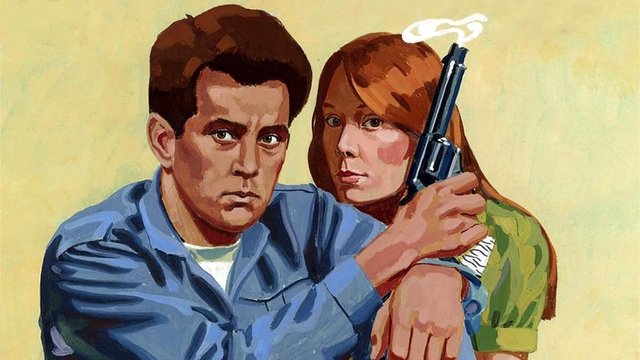
"What film was and what will never be again", phrase used in the latest Turner Classic Movies commercial, is a perfect description of 1970s, era when everything seemed possible in the world of Seventh Art. In that time Hollywood was willing to experiment and invest money, stars and other resources in projects that would seem too "artsy" even to the most refined or snobbish among present-day filmophiles. Many of those experiments failed, but those that didn't later proved to be the greatest films of all times, with quality unsurpassed by latter generations. One of such films is Badlands, 1973 drama and directorial debut of Terence Malick.
The plot of the movie is loosely based on the real life story of young Charles Starkweather and his fifteen-year old girlfriend Caril-Ann Fugate - duo of delinquents who terrorised American Midwest during their short killing spree in 1958 (depicted in 1993 television docudrama Murder in the Heartland). Protagonist and narrator of the film is Holly Sargis (played by Sissy Spacek), shy, introspective fifteen-year old girl who lives with her middle-class father (played by Warren Oates) in a small town in South Dakota. Kit Carruthers (played by Martin Sheen), a school dropout ten years her senior who works as a garbage collector, but nevertheless looks like James Dean. It is enough for Holly to fall in love with him and two of them start a relationship. Mr. Sturgis is not happy about this and tries to set them apart, while Kit is equally determined to remain with Holly. The conflict ends with Kit killing Mr. Sturgis, and Holly, after initial shock, decides to follow her boyfriend during his run from the law. At first, Kit and Holly try to hide in the woods and build a makeshift home, but their idyll is again interrupted and Kit drives north, towards badlands of Montana in order to find shelter from the law. Along the way he kills few more people and two of them become instant celebrities and targets of national manhunt, thus making Kit's vague goal of escaping even less realistic.
Probably the main reason for Badlands greatness could be found in its ability to allow different viewers to project various different interpretations in the seemingly limited framework of Terrence Malick's masterpiece. For some viewers Badlands is metaphor for the ideological emptiness of America, spiritually drained after Vietnam fiasco and social turmoil of 1960s. For other, Badlands is character study that perfectly depicts phenomenon known as "banality of evil". Some might see Badlands as an ironic comment on the modern media that turns criminals into instant celebrities. Other might find more universal themes like the loss of innocence, human relation to mortality or human/individual insignificance in comparison with the majesty of universe, perfectly symbolised in the empty but still magnificent plains of Montana, captured by Tak Fujimoto's photography. All that and some more could be found in mere 95 minutes of Badlands and this is the film that might provide new insight with each repeated viewing.
Malick shows incredible skill for a novice director, making Badlands nearly perfect film in which plot, characters and setting play equally important role. Editing is excellent, allowing the plot to naturally flow from depiction of teenage romance into depiction of crime spree without changing the tone. Another reason for that is an excellent casting. Martin Sheen, whom contemporary audience knows only as an elder statesman in West Wing, is incredibly convincing as a young punk who desperately tries to find some importance for himself by playing the rebel. His performance is cool and detached, yet chilling, making Kit Carruthers into one of the most effective psychopaths in the history of cinema. Sissy Spacek, who was in her mid-20s during the production, is equally effective as 15-year old girl whose lack of experience, seclusion and fantasy world of movie magazines and pulp fiction leads her to mistake a young psychopath for some kind of romantic hero. Spacek is seemingly passive on the screen, but her cool, detached off-screen narration in which she romanticised the prosaic on screen reality, provides an ironic contrast.
Acting style perfectly fits Malick's directorial approach towards the story, which is cool and detached. Unlike many Hollywood directors, Malick doesn't make any moralistic stand - he doesn't condemn Carruthers as a monster nor he tries to paint him as some kind of anti- establishment hero. Viewers are left to make their own conclusions and give the meanings they want to give. This cold approach could be also found in a rather unusual choice of music. Malick uses 1950s pop songs to give ironic commentary, as well as classic themes by Carl Orff and other composers (making Badlands one of the rare films to use Orff's piece which is not "Carmina Burrana").
Perhaps the only flaw in Badlands could be found in the comparison with the films that came later. Film like this tend to reminds us of more contemporary over-hyped garbage like Natural Born Killers and make us nostalgic towards the "films that will never be again".
RATING: 9/10 (++++)
(Note: The text in its original form was posted in Usenet newsgroup rec.arts.movies.reviews on February 26th 2002)
==
Blog in Croatian https://draxblog.com
Blog in English https://draxreview.wordpress.com/
Cent profile https://beta.cent.co/@drax
Minds profile https://www.minds.com/drax_rp_nc
Brave browser: https://brave.com/dra011
BTC donations: 1EWxiMiP6iiG9rger3NuUSd6HByaxQWafG
ETH donations: 0xB305F144323b99e6f8b1d66f5D7DE78B498C32A7
Movie URL: https://www.themoviedb.org/movie/3133-badlands?language=en-US
Critic: AAA
I love fantasy and pulp fiction movies thanks alot for sharing , I will add this movie to my watch list thanks alot friend
Downvoting a post can decrease pending rewards and make it less visible. Common reasons:
Submit